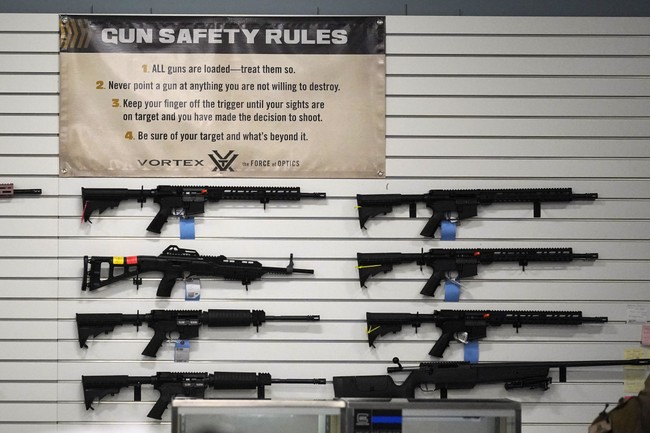Illinois Attorney General Kwame Raoul is hedging his bets ahead of a federal judge’s decision on the future of the state’s ban on so-called assault weapons and large capacity magazines.
U.S. District Judge Stephen McGlynn gave both parties in the legal dispute over the Protect Illinois Communities Act until Monday to submit their final briefs in the case after a bench trial wrapped up about a month ago. The Illinois AG’s office produced a last-minute document dump of more than 3,000 pages of arguments and exhibits in the hopes of keeping the ban in place, but Raoul also had a request for McGlynn if he finds that the law violates the right to keep and bear arms.
Among the state’s closing arguments are that restricted items “were designed for military combat,” “far exceeds what is commonly used for self-defense” and the law “responds to unprecedented societal concerns.”
“Plaintiffs are not entitled to a permanent injunction because they have not prevailed on their claims,” one filing from the state says. “If the Court disagrees, however, any injunction it enters must be limited in scope and should be stayed pending review by appellate courts.”
Plaintiffs argue the law violates the Second Amendment right to keep and bear arms and runs afoul of precedent set by the U.S. Supreme Court that any law restricting access to firearms must fit in the text, history and tradition of the Second Amendment.
If McGlynn does find that the law violates the Second Amendment, as I suspect he will, then there is no good reason to keep the law in place while Illinois appeals to the Seventh Circuit. In fact, if the judge truly believes that PICA is a violation of our civil rights, I’d say he’d be derelict in his duty if he allowed the law to be enforced while the state appeals his decision.
Now, having said that, I also expect that if McGlynn doesn’t impose a stay, the Seventh Circuit Court of Appeals won’t take long to do so. McGlynn previously issued a preliminary injunction enjoining enforcement of some aspects of PICA, but his decision was overturned by the appellate court, which allowed the law to be enforced while the litigation proceeded to trial. The Seventh Circuit panel that heard the earlier appeal of the injunction essentially agreed with the state’s contention that the commonly owned arms and magazines banned by PICA weren’t protected by the Second Amendment because they’re “like” machine guns, and though the plaintiffs took great pains during the trial to document the substantial differences between semi-automatic firearms and full-auto machine guns, the appellate court may very well just rubber-stamp the state’s request for another stay.
Unlike the appeals court, which bought into the state’s erroneous contention that only arms commonly used in self-defense are protected by the Second Amendment, McGlynn seems to understand that the Supreme Court has said arms that are in common use for lawful purposes including self-defense are, prima facie, protected by the language of the Second Amendment. AR-15s and other semi-automatic rifles and shotguns may not be as commonly used to protect individuals as handguns, but there are still plenty of gun owners who rely on them to protect their home and property.
In his comments from the bench as the trial was wrapping up last month, McGlynn brought up the 1917 riots in East St. Louis, in which dozens of people were killed and thousands of residents lost their homes. McGlynn wondered if that mob violence would have been mitigated or prevented if citizens had access to arms like the AR-15.
He said 39 people died in burning buildings rather than escape into gunfire. Others jumped off bridges.
He said it was a successful neighborhood.
“What if they had the kind of weapons we are talking about here?” he said.
“Some academics and jurists say the Second Amendment has nothing to say, that it’s too old.
“You never know what’s going to happen to you.”
While the Second Amendment protects an individual right to keep and bear arms, I’d say it also includes the right to use those arms in both individual and collective self-defense, as McGlynn suggested.
As we’ve seen in just the past few years, when the excrement has hit the fan blades in communities from coast-to-coast, plenty of Americans of all races, colors, and creeds have used AR-15s and other semi-automatic rifles to protect their homes, businesses, and neighborhoods. These same arms are also commonly used for other lawful purposes like hunting, recreational shooting, and competition. Yes, these guns are also used by some criminals to commit horrible acts of violence, but that alone doesn’t justify a ban on their lawful sale and possession. After all, handguns are the most common firearm used in crime, and the Supreme Court has already said a ban on handguns isn’t constitutional.
Now that the final round of briefs have been submitted, McGlynn could issue his decision at any time. I’d be downright shocked if McGlynn ruled in Illinois’ favor, and bitterly disappointed if McGlynn gives gun owners a win on paper but immediately stays his decision and allows PICA to be enforced on appeal. The people of Illinois deserve to have their liberties restored, and McGlynn has the power to make it happen, at least temporarily.
Read the full article here





![‘You Can’t Do It’ [WATCH] ‘You Can’t Do It’ [WATCH]](https://www.lifezette.com/wp-content/uploads/2024/10/2024.10.16-04.52-lifezette-670fef5f56386.jpg)


